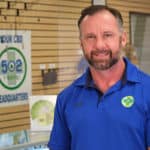
Read the Full Transcript
Introduction
Matt:
Hi, I’m Matt
Dee Dee:
And I’m Dee Dee. We are the hilarious outcome of opposing brains sharing a mutual desire to share knowledge and positivity when thinking about hemp and cannabis.
Matt:
We are here to tear down the walls built by big pharma and other big companies that seek to keep the human race and fear divided.
Dee Dee:
We are here to shatter the myths about hemp and cannabis and change the stigma of this amazing plant. Welcome to Hemp and Happiness with the hemp queen.
Matt:
And emperor.
Dee Dee:
Podcast. Join us as we venture into this misunderstood and the unknown.
Welcome
Dee Dee:
Hey, thank you guys so much for listening to us and, uh, checking out our podcast. We, um, super excited about today. Um, we got to, we get to welcome miss Katie Moyer from the Kentucky hemp association. She is our current president and she is also a business owner, Kentucky hemp works. And what is it that you’re running for miss Katie?
Katie Moyer:
Well, I am currently running for county judge executive in Christian county.
Dee Dee:
I couldn’t remember the county where it was, but that’s awesome. What made you decide to do that?
Katie Moyer:
Well, I’ve got a lot of experience with, um, working with local governments. Mm-hmm <affirmative> so I, I spent a lot of time in the 24 Western most counties interviewing all the different elected officials on city and county level and in doing so I learned a lot of the problems that county and city government has and, and a lot of solutions as well. So I’ve got that experience. Like I, I understand the roles and responsibilities, but at the same time, I also have some experience fighting government. So I I’ve
Dee Dee:
Kind
Katie Moyer:
Of fought against, um, government and, and big industries and big social media over the years. And I think that that experience of working around government, but not necessarily being entrenched in government mm-hmm <affirmative> will serve me well in this position.
Dee Dee:
I think it will too. You know, Katie, um, we, the hemp industry here in Kentucky, Ohad a huge big thank you because she did something that, um, I’m getting goose pimples, just thinking about it, Katie, but we, me, you and Jenny, we work so hard to, uh, stop SB one 70, and I know that you were there at Frankfurt fighting for our hemp rights here in Kentucky. And thank you. Thank you. Thank you. I think we can all thank you for that. Um, but if you want, if you want, I wouldn’t mind you going back and kind of starting your, um, tell us how you got into the hemp business, like back. Good old go to good old days back. What 2014, cuz you’ve been, you’ve been doing this as long as John and I have mm-hmm <affirmative> I mean, so tell me,
Katie Moyer:
Yeah. Yeah, 2014 was the first year that we grew hemp here. Um, it kind of goes back a little further, cuz we had about five years where we were trying to pass, uh, a bill to legalize hemp and create a regulatory framework to, to actually grow it. And it wasn’t until, so we passed a bill in 2013 and started working on regulations, but we kind of threw all those regulations out the window in 2014 when Congress passed the first iteration of the, the farm bill that included industrial hemp pilot projects. And uh, so I was asked by our ag commissioner, James Homer, if we, if I wanted to grow hemp and I was like, well of course I do. You know, that’s what we’ve been fighting for. But at the same time, I had no idea what to do. I didn’t know where I was gonna get seed. Didn’t know how I was gonna plant it or harvest it or anything. And we ended up ordering 250 cent, uh, 250 pounds of seed from Italy, which was hijacked in Louisville by the DEA. So maybe these
Dee Dee:
Are
Katie Moyer:
Customs and Chicago. Yeah. These were seeds <laugh> and they were, they were completely legitimate. I mean they had all the paperwork, all the custom papers were in order. Everything was absolutely the way it needed to be, to import any kind of seed in the country. And uh, the DEA got wind of it by the time it got to Louisville, they swooped in and hijacked it. And that’s when I thought I was going to prison for the first time in my life for importing 200 to 50 pounds of a controlled substance, the country. But our ag commissioner who’s who was absolutely kick ass. I don’t know if I could say that on here, but he,
Dee Dee:
Yes, you can kick ass
Katie Moyer:
<laugh> um, he, he swim and
Dee Dee:
We’re talking about, and we’re talking about which, what was his name? This is
Katie Moyer:
That’s James comer. Thank you. Who currently our Congressman here in Western Kentucky. Um, but he came in and sued the DEA and federal court got our seeds back. And since we successfully had the certified seeds, we ended up sharing those with university of Kentucky Murray state university and other schools around the state. Um, and we had enough to plant just a couple of acres of this Italian fiber crop. So harvested it, no clue what to do. Um, but after we cut the stalks and kind of bailed them up for fiber, uh, my best friend and I went out and started digging roots out of the ground and we used those roots to make topical SA mm-hmm <affirmative> and there was no C B D no THC, but these magical little terpenes in the roots that smell like carrots when they’re fresh, by the way, if you’ve never smelled hemp roots, they kind of smell like fresh carrots.
Katie Moyer:
And uh, but we use those to make a S and started experimenting on anyone that stood still long enough for us to coat them in and roots SA. And after a few weeks of doing that, we kept getting phone calls from people who are like, man, this S is helping so much. I need some more of it. I haven’t Alor tab all week. I really want more of this stuff. And at that point, um, before hemp seed oil, before CBD oil, before we got into any of those things, we were making stuff from roots and realized like, okay, this is, this is a business idea. We see a need let’s fill that need. And so that’s kind of how Kentucky hemp works, originated. And then we invested in an oil press where we could cold press seed for the vegetable oil. And then we started investing in CBD extract from Commonwealth extracts mm-hmm <affirmative> and, um, and then that’s, that’s sort of how we rounded out, you know, using the entire plant. And we added on some products that we used the stalk for. So we’re using every bit of the plant.
Dee Dee:
That’s awesome. I remember when John brought home the, um, you call it S I turned, I, I changed it to bomb just cuz people were like, they couldn’t say SAV. Um, but I remember the first time I got to use it and I was, I started using it and I was like, John, we need this. Like we have to have this all the time. He’s like, he’s like, yeah, I think we’re gonna do a little license thing and start making it. And I’m like, yes, it is. It has been one of my favorite topicals. You didn’t know that story, did you, Matt? Yeah, that, that recipe is from Katie Moyer, our, uh, our famous bombs that, and I do got my own sense too. It Katie, I had to spice it up a little bit. Oh yeah. But yeah, we, yeah, totally. I love our, I love that bomb and, and our customers love it. Everybody that uses it, the only complaint I’ve ever heard is that, um, sometimes it can stain your clothing. That’s just when you need a little Dawn. Yeah. Little Dawn, but I put it all over my face. Well, re everything
Katie Moyer:
Being completely naked when you
Dee Dee:
Use it, of course
Katie Moyer:
You can reach everywhere.
Dee Dee:
<laugh> exactly use it for all the crevices and parts. That’s one of our things.
Katie Moyer:
Exactly.
Dee Dee:
Yeah. It’s one of our best.
Katie Moyer:
We use it for anything that hurts burns or Richs mm-hmm <affirmative> and we found there’s just nothing better when you have a sunburn, especially if you get it on there right away. Mm-hmm
Dee Dee:
<affirmative> I actually burnt my thumb and a and a, I was steaming some vegetables and burnt my thumb really bad. And I instantly put that on and it didn’t even bubble up. So I was pretty, I was like, hell yeah. And anytime that’s the running joke now in the family, I’m like, did you put some Bal on it? Did you put some SAB on it? Do you, I mean, that’s all you need. That’s all you need. So yeah, we, we love that. We love thats that you did. So, so bring me, bring me up to date. What are some of the issues that happened in, um, 2016 with some of the, uh, stuff with, um, the new Kentucky department of agriculture and the new commissioner was that, is that when that happened,
Katie Moyer:
We sort of started finding, you know, with the, the original hemp program, it was very laid back, very hands off mm-hmm <affirmative>. Um, and, uh, we, we had a new ag commissioner come in and he was originally very willing to talk to us about hemp issues. And, and so we maintained a close dialogue and there were some things that I, I felt like he kind of fixed right away, like, uh, adding an appeals process. So if you, if you got denied for having a hemp license, then you could appeal it and get another shot. And what they found was a lot, most of the people who did get denied and appealed it then went on to get a, a hemp license. But we also sort of got into, um, this mindset. And I’ll, I’ll tell you how, um, my grower describes it. It’s like, if, if you, if you wanna fart in the field, you gotta give them two weeks notice <laugh> and it became such a struggle to try to, to try to plan everything two weeks in advance mm-hmm <affirmative>.
Katie Moyer:
So you can let the regulators know exactly what you were doing all the time. And it was, um, it was just an example of big government, you know, sort of a bureaucracy outgrowing, what it really did to do or effective and of. And so, so yeah, that, that was extremely challenging. And then when, typically when you have government sort of outgrowing itself, then they’re always trying to find more things to justify the size of that, of, of that program. So, well, we’re big and, and we, you know, have to be involved in everything. So we’re gonna dictate how we test everything. We’re gonna dictate how you harvest and we’re gonna dictate, you know, like I said, seems like if you have farted in the field, mm-hmm <affirmative>, you had to give them two weeks notice and, and you just can’t do that with agriculture. You don’t know what the weather’s gonna be like, you can guess, you know, everybody makes educated guesses, you can watch the weather, but you don’t know if a combine’s gonna break.
Katie Moyer:
You don’t know if your setter’s gonna, you know, have some random thing wrong with it. And it really, you know, farming is, um, it’s a practice and risk management. You’re constantly managing risk. You’re constantly, you wake up that morning and you might have an idea of what you’re gonna do that day, but then you get to work and you’re like, well, okay, that’s, I didn’t expect to be doing plumbing work today, um, or doing mechanic work or maintenance on, on your machine. Um, and those kinds of things set you back. So if you have to, you know, try to, to plan out, yeah, I’m gonna harvest two weeks from today. So I’m putting in my report that I’m gonna harvest and the ag department’s gonna come out and test it. But, but I don’t know if they’re gonna be here on time. And, and if they don’t, I can’t harvest, even if I’m ready now and if they do, but then my tractor breaks down or, or, you know, my picker, my combine breaks down, then I’ve gotta get it fixed. And then I’ve gotta put in another harvest report and then they’ve gotta test it again. And it just becomes this like exercise and, and, um, just running circles with big government. So we’ve seen a lot of that. And, you know, I know that was just one or two small examples, but every year it seems like we’re, we’re going back and trying to like tie up all these little loose ends and, and make things easier on hemp, farmers and producers.
Dee Dee:
Do you, do you think easier because it’s actually seems a little bit harder now with some of, um, mm-hmm, <affirmative> the roles that are in place as far as, when did that happen? I think 17 or 18 when they changed it, or even 19, maybe after the 2018 farm bill, they switched it to, um, you couldn’t have the first extract because it was over the 0.3% being sent to another processor to where they could refine it. Some magic had to happen that year. Didn’t it? I don’t remember what year that was though, Katie. Um, but we still can’t ship it outta state. I mean, right. Unless that got changed.
Katie Moyer:
Yeah. Yeah. There’s a lot of these little nitpicky annoyances that just really are not helpful. Um, that example that you were talking about with the extract, mm-hmm, <affirmative>, you know, when you concentrate extract, obviously it’s gonna be above 0.3% THC. Right. And then the argument was, well, that’s a controlled substance. You can’t move it around, you can’t sell it. And I mean, it took us over a year and a half of trying to convince the ag department to change that. Right. And it wasn’t until, you know, big, like public spectacle of, of calling the, the ad commissioner out publicly that anything actually happened. And, um, and then, you know, once that happened, it was like, snap, your fingers everything’s fake. So yeah, just, just, um,
Dee Dee:
Fill out a form,
Katie Moyer:
You know, you just have to let us know if you’re gonna transport it and tell us where you’re transporting it too,
Dee Dee:
But it’s, it’s still only ends do that
Katie Moyer:
A year ago.
Dee Dee:
Right. But it’s still only in state. Yeah. Like they can’t, they can’t sell it out. State, you ship it outta
Katie Moyer:
State,
Dee Dee:
Even though yeah. Hemp has been removed as a schedule one, but hemp has been removed from a schedule one. Yeah.
Katie Moyer:
And all 50 states.
Dee Dee:
Yeah.
Katie Moyer:
And has been legalized on, on the state level, in every single state in the mm-hmm <affirmative>, there’s not a state that we have to be concerned about. Every single state took it upon themselves to legalize hemp. Right. And we still can’t ship it outta state,
Dee Dee:
But other states can, it’s just here in Kentucky. Oh, sure. Yeah. And we’re supposed to be the leaders in the hemp industry, and yet they have these kind of roles and not even to mention the smokeable flower, which we need to get into that too. But our department of agriculture has actually stifled some of that growth, um, on our farmers and our processors because of some of these rules.
Katie Moyer:
Absolutely. Absolutely. So,
Matt:
So Katie, in, in your role, uh, should you be elected as judge executive? How can you exact change with this?
Katie Moyer:
Well, I, I’m glad you asked because I’m a big proponent of, uh, governing from the ground up. You know, I think I’ve worked on the grassroots in a lot of different issues, including this one. And you’d be surprised how much counties can accomplish on the state level by leading by example. So if we propose, let’s say a resolution, uh, encouraging hemp production, maybe a smokeable flower or craft hemp, flower microgreen, things like that. Um, or, or potentially something like Louis did with the lowest level enforcement policy, those types of things they, they catch on. And so one county passes it, then the, you know, starts talking to another county and then they pass it and another county passes it. And then those counties go to Frankfurt and they say, Hey, look, we’ve, we’ve done this in our county. It’s been great for our county. Uh, the economy is stronger.
Katie Moyer:
We have less crime, uh, law enforcement happier because they’re not chasing around people for a joint. Um, and that, that becomes a major factor in how legislators vote because one person to a legislator represents like 10 votes, at least. So if you say, well, I’ve got 75 people in my, I mean 75,000 people in my county, which is roughly what we have here. Um, and I go to that legislator and I’m like, man, 86% of the people in this county is support this issue. They’re like, holy crap, that’s a lot of votes. And all I wanna do is get reelected. You know, that’s what most legislators are thinking about their next election. So if you can come to them and say, you know, we have, we have this many people in your district that support this issue. They will almost undoubtedly fall into line or, or go along with, with your opinions on that issue. And some of them can be stubborn. And we’ve seen that in, in the Senate this year. They’ve been, well, not just this year, either. Right? Um, like with the medical marijuana issue, um, you know, you got one or two people in the Senate just saying, look, we’re never gonna change our minds about this. It doesn’t matter if over 90% of IANS support this issue, we’re, we’re never gonna change our mind.
Dee Dee:
So how do we get them out of office? How do we get those people out of office then Katie, if they’re not representing what the people want, how do we get them outta office?
Katie Moyer:
That is a really good question. I would look at, um, you remember Greg Stumpo mm-hmm <affirmative> he was the, the, um, house, house leader. He was the speaker of the house, and I never thought that anybody would ever beat him. It was like, the people in his district were like, they were like in an abusive relationship and they just kept voting for him, voting for him, voting for me, like going back to him. And I kind of feel like that’s how it is in diver district. You know, he is not really representing the will of the people. Right. Um, I mean, he is, he’s in Eastern Kentucky where we’ve got some of the highest rates of, um, you know, prescription, uh, drug abuse, pain killers, opiate abuse, heroin, and heroin mm-hmm <affirmative>. And what, what really is it doing for his constituents to keep them from having an alternative that’s non-addictive and non-habit forming, uh, that, that is actually truly healthy. Mm-hmm <affirmative> not just masking symptoms or helping you to get by, but truly improving your health. And he is like, just go drink some bourbon if you need to relax.
Dee Dee:
Right. Like poison by all means, put the poison in your body.
Katie Moyer:
I just don’t. I don’t know what it’s gonna take. Yeah.
Matt:
Well, I, but I like what you said about, you know, essentially the small X philosophy, one, one voice counts for 10 votes mm-hmm <affirmative> and mm-hmm <affirmative> this agenda. Our agenda is gaining speed, gaining popularity, you can’t it’s, it’s impossible to keep it out of the, the press now, um, with a favorable opinion of hemp, uh, and a favorable opinion of the industry, even though there’s bad size to the industry, there’s bad size to anything the positivity is becoming overwhelming. So I really like what you said there. And I, I think that that’s how the only way we can beat it is to continue to share a voice, to continue to vote for people like you mm-hmm <affirmative>, um, who can then turn, uh, represent the best interest of the public. Um, and eventually that, that, that 1% becomes overwhelmed, um, when the voice is too strong to not be heard.
Dee Dee:
Exactly. And that, that leads us into what we worked so hard in this past legislative session, because we’ve talked about this on our podcast about Delta eight and the other, um, designer cannabinoids that are coming out on the market. And while we, uh,
Matt:
Delta eight is not a
Dee Dee:
Designer. Exactly. And I was just getting there, sorry. Um, we’re not into those ones that are kind of on the questionable side as to being synthetic Delta eight is not. And we have, we worked our asses off to keep it legal here in the state. And, um, that was one thing that really got me. And I was, even though it managed to get out of the Senate, I was so overwhelmingly happy. And, um, <laugh> just relieved that we managed to stop it in the house. And I know that had a lot to do with the lobbying. You did the lobbying that can, that the Kentucky hemp association did the lobbying and calls that all of our customers made and our friends and just everybody that they all came together to try to stop this because this bill, as it was written was not pro hemp.
Dee Dee:
It was, it would’ve actually destroyed a lot that we had going on. And it would’ve actually decimated the hemp industry with the rules that they had about the naturally occurring Delta eight, because it is naturally occurring in that plant. But the limits that they put on it, I mean, I have CBD that has higher Delta eight percentages in it naturally like, what the hell, man, it’s a natural cannabinoid. You can’t just all of a sudden start coming in and doing this. And I get the fear, but if we had the regulations and our Kentucky department of agriculture, let our Kentucky processors make it, then we could have it tested and we would know how safe it is. But instead retailers like us, we’re left to buy it from outta state. I don’t like doing that. You know, I’m a big proponent for Kentucky and Kentucky hemp and our Kentucky processors and our Kentucky, Kentucky farmers.
Matt:
So Katie for, for our listeners out there that would like to make a difference, um, and like to contribute to the cause. What would you recommend for them?
Katie Moyer:
Well, so we’re still involved obviously in some legal battle over Delta eight. That’s not something that’s cheap, it’s something we’ve been fundraising for since what August of, of last year. Yes mm-hmm <affirmative> and, um, and it’s potentially gonna be something that’s appealed and we’ll have to continue to raise money for. But what we’re hoping is that we can, uh, do one more fundraising push for, uh, for the Delta eight legal fees and then, um, settle it in the legislature. So we don’t have to continue appealing and, and go to, you know, court and, and continuing to go with the, uh, through all the legal stuff. So the best way I think to, uh, to support the Delta aid issue is to go to keep da legal.com and donate using the PayPal link there. Um, but also, you know, getting in touch with your legislators, your representative, uh, on state level, your state Senator, um, even if you don’t, you know, even if you don’t agree with them on everything, develop a relationship with them, stop in when they’re at an event, out in the public and introduce yourself and then follow up with a thank you email.
Katie Moyer:
And then the next time see you at an event, it’s likely that they’re gonna be like, oh yeah, I remember you. And once you start building that relationship with your legislator, you get to the point where you’ve got their cell phone number and they’ve got yours and they respond to your emails. You can be so effective. Um, from the grassroots, there are huge things that you can do in Frankfurt, just by having a relationship with your one state Senator or your one house rep. Um, and, and I’ve gotten to the point from over the years where I’ve got relationships with a lot of people’s state reps and a lot of people’s state senators. And, uh, and that’s extremely helpful when, for example, we were in Frankfurt this year pushing for Delta eight and, um, you know, one legislator’s like, and I’m, I’m cool with that. Yeah. I’m gonna support you on this. So obviously donating to the fundraising is the most important thing. It’s like our highest priority right now, but something that’s a constant underlying theme is developing a relationship with you with your, uh, state legislators. That’s something that’s gonna help in the future, cuz Delta, eight’s not gonna be the last bit battle that we have on, on cannabis in general. There’s always gonna be a new fire to put out a new fight and, uh, having those relationships in place makes the fight a lot easier.
Dee Dee:
Agreed. Yeah.
Matt:
Well said, well
Katie Moyer:
Said donating money, that’s our priority right now keep D eight legal.
Dee Dee:
We will make sure we add that to the podcast. So people know for sure. Yeah, definitely. So what’s in store. I mean, you, I know you’re the president of the Kentucky hemp association right now. Um, we, I know I’m obviously we’re, we are obviously a member as well and we’re working to keep growing that. And I think we’ve managed to do a pretty good job, um, with getting a lot of retailers into that association so we can all work together. I think that is the most important part, um, because we, as a society and as hemp, uh Conos we need to stick together. Um, that is so important. And I think, um, you know, there’s still stores getting rated for these products. There are still Sheriff’s office going in and saying, well, you know, it’s illegal, it’s marijuana, it tested positive. And my argument every time is the fact that it’s going to field test THC.
Dee Dee:
You need to send it to labs for the, for the percentage. And I just think that it’s all about educating our sheriff depart our Sheriff’s departments a lot. I mean, I know we already have our temporary injunction still in place, which is great. Um, that says Delta eight is legal, but a lot of these smaller counties and the sheriffs, they’re still going out and raid stores. And that’s the one thing that I think we all need to work together to, to get that stopped. I think that that is, um, that just puts a bad taste in a lot of retailers’ mouths if they’re still doing it.
Matt:
So yeah. Well either here.
Katie Moyer:
Yeah, absolutely. I mean, why would you wanna open a store in Kentucky if you have that, that fear.
Dee Dee:
Exactly.
Matt:
Yeah. So, so yeah. So keep, keep the eight legal mm-hmm <affirmative> talk to your legislatures.
Dee Dee:
Exactly. Yeah. Katie, thank you so much for joining us. Um, I am, I, I’m pretty proud of you. Um, I think you are gonna do an excellent job as the next judge exec in Christian county. Um, I, yeah, you go girl, you get ’em we all, we need more people like you representing us little folk in all the counties, so thank you. Thank you for everything you’ve done for us, for sure. So
Katie Moyer:
Thank you for having me on the show.
Dee Dee:
Yeah,
Katie Moyer:
For sure. Figures crossed. We got two weeks left, so, but yeah. Keep D eight legal.com. That’ll help take a little something off my mind so I can focus on the raise.
Dee Dee:
Exactly. Thanks, Katie. Have a great day.
Katie Moyer:
Thanks for having me.
Dee Dee:
Thank
Matt:
You. Yeah. Good luck.
Dee Dee:
And we’ll be written for you. Heck yeah. And thanks everybody again for listening to us. That was Katie Moyer. She’s the current president of the Kentucky hemp association and running for the Christian judge executive, um, office there. So definitely give her some kudos and thanks again for listening to us, follow us on all social medias. If you’ve got questions and you want answers and you even, Hey, have an idea, a topic for us, send us an [email protected]. We would love to get your feedback for sure, but you can find us on all the major platforms. We even have our own YouTube channel. We’re on Facebook. We’re on Instagram. We’re on TikTok sometimes. Um, but you can definitely, uh, drop us a note. Let us know how things are going and we appreciate you all listening. Have a good one, keep it hippy out there.
Matt:
See ya.
Dee Dee:
Thanks for joining us for another episode of hemp and happiness with the hemp
Matt:
Queen and emperor.
Dee Dee:
Keep your mind ever open and expanding, like subscribe, review, follow us all the good stuff
Matt:
And keep it
Speaker 4:
Hippy out there.













